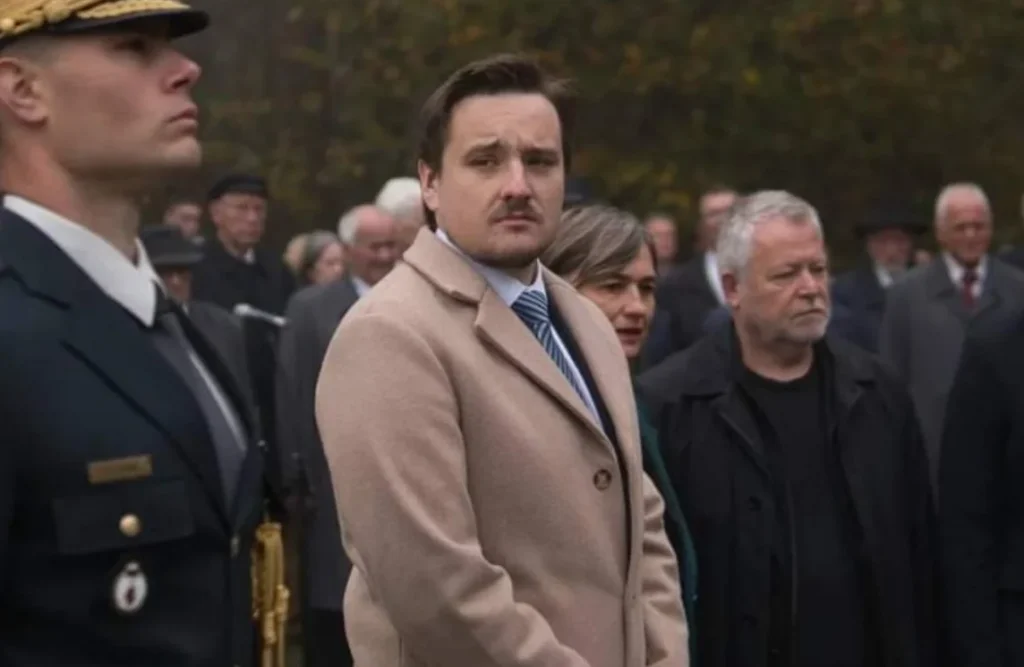On Saturday, at St Ulrich’s Hill (Sv. Urh), in front of a modest audience of the heirs of the greatest crime on Slovenian soil, a member of the ruling Freedom Movement party (Gibanje Svoboda) made a bunch of controversial and verifiably false and unconstitutional statements, which historian Dr Jože Dežman commented on for the media outlet Planet TV.
For many, the Day of Remembrance of the Dead was marked by mourning ceremonies and visits to cemeteries, while the Freedom Movement MP used the 1st of November for “a fervent speech that even the worst Stalinists from the times we thought we would leave behind with independence would envy,” Planet TV commented on Lenart Žavbi‘s appearance.
“The neo-Nazis are also sitting in parliament, and the next years will be the battle of a generation with the far right,” were Žavbi’s opening words. We are already used to incitement and negativity towards those who dare to disagree with the ruling party in any way, but this was certainly the icing on the cake. He went on to describe cooperation with dissenting parties as a “betrayal of one’s own values” and ruled out any possibility of cooperation with such parties in the next year and a half. But his speech did not end there.
Žavbi doesn’t know that worshipping the supreme criminal is forbidden
“We Slovenians are lucky in a way that many other nations are not, that we did not only have saints in books, but we even had them in practice – Slovenian saints are called Tito’s partisans,” he continued.
The absurdity of his claim was commented on by historian Dr Jože Dežman, who explained that “Christian saints are heroes of non-violence, while communist saints are heroes of violence, and the supreme god of this violence was Josip Broz – Tito, and Mr Žavbi could finally accept that the Constitutional Court of the Republic of Slovenia had already banned the worship of the ‘Supreme ruler’ or ‘supreme criminal of communism’ in 2011.”
“Slovenians who carried out terror against their own brothers would have suffered the same fate as their brothers, or as the Jews, in a Nazi state, when it would have dominated the whole of Europe,” Žavbi continued, however, it is a fact that during the revolution, the partisans murdered more than 100,000 people in Slovenia, including more than 25,000 Slovenian men and women. This is the data of the Study Centre for National Reconciliation, and Dežman added that “it is a relatively well-known fact that the Communists suppressed the civil war, that they murdered about 25 thousand Slovenians – the anti-Communist side – and that this number, 25 thousand Slovenians, is about five times higher than the number of partisans killed by Slovenian soldiers.”
According to the Study Centre for National Reconciliation, by the end of 1941, the revolutionaries had murdered 171 people, 160 of whom were non-military and 11 were deserters from the Liberation Front (OF). In the summer of 1942, 13 civilians were killed by the partisans in the vicinity of Šentjošt. The first village guard was established only on the 17th of July 1942, and the Slovenian Home Guard on the 6th of December 1943.
Žavbi cannot accept the basic fact of defeat
“The crime of the Roman Catholic Church, or more precisely the Archdiocese of Ljubljana, institutionalised against its own people during World War II and, secondly, after 1991, when the denationalisation and attempted cover-up of the crimes of World War II was carried out here,” were Žavbi’s words, with Dežman marvelling at the persistence of the Stalinists in their fight against the Catholic Church. “One of them is also Mr Žavbi, but the fact is that communism wanted to destroy Christianity and other religions and replace them with its own religion. But this religion has actually failed. Both Christianity and the other religions, meanwhile, are still alive, that is to say, Mr Žavbi – again – cannot accept the basic fact of defeat.”
The Roma people remain unburied
Žavbi tne read the quote, “When they came for the Roma people, I was silent, I was not Roma. When they came for the trade unionists, I was silent, I was not a trade unionist. When they came for the Jews, I was silent, I was not a Jew. In the end, I was left alone.” That Žavbi once again wanted to twist the real facts with an “emotional” quote is proven by the data of the National Assembly’s Commission on Concealed Mass Graves, namely that in Ljubljana, they still refuse to allow the burial of Roma who, according to their findings, were murdered by the partisans in 1942.
“At this very moment, we have a situation in Ljubljana where this municipality is trying to ban the burial of the Roma murdered by the partisans and the 3,450 victims of the largest fratricide in Slovenian history from the cave under Macesnova gorica, and Mr Žavbi apparently sees these actions as an example,” Dežman concluded.
The Slovenian nation wrote its own judgement in 1945, it wrote it in 1991, and it will have to write it in 2026, concluded the Freedom Movement MP, and he is certainly right about the latter.
T. B.


